Why choose this programme?
Drive new innovations in cancer research.
The Cancer Research UK Manchester Centre MB-PhD is a fully funded three-year programme open to MBChB students at The University of Manchester, the University of Leeds and University of St Andrews (Manchester pathway) wishing to combine clinical practice with research.
This training route will see you work towards both your MBChB and PhD awards over the course of the programme, combining your medical training with research training in a cancer-related field.
Each year, we aim to recruit the best candidates who are seeking to drive new innovations in clinical care and research. Our first cohort of students started their studies in September 2020.
About the MB-PhD
Clinician scientists play an essential role in cancer research, bridging the gap between patients and scientific research.
Working across both the clinic and the laboratory, clinician scientists are in a unique position to reflect the needs of people with cancer in the discovery of new treatments and tests.
A PhD is one of the highest-level academic degrees that can be awarded.
Unlike most undergraduate and master’s programmes, a PhD is a pure research degree but this doesn’t mean that you will only spend three years in a library or lab.
There are many opportunities for professional development including; networking and communication, teaching, presenting at conferences and opportunities to publish work.
Currently, most UK trainee clinician scientists take on a PhD after completing their initial medical training, often when they are in their thirties.
Cancer Research UK launched their nationwide MB-PhD programme after seeing a decline in the number of clinicians on an academic career pathway, particularly female researchers.
Doing a PhD during medical school can accelerate your academic career before you get too embedded in clinical work or have other commitments.
The skills you will acquire can be applied in many areas of medicine and you will learn valuable critical appraisal skills early.
On completion of your MB-PhD you will graduate as a doctor at the forefront of your field.
Cancer sciences is such a broad area that it can be applicable in all aspects of medicine, surgery and general practice.
You will develop invaluable transferable skills and be fully equipped to start a career in clinical research.
Cancer sciences is linked to areas of medicine such as:
- clinical oncology
- clinical genetics
- medical oncology
- pathology
- radiology
- surgery
Programme
A combined approach.
You will benefit from a bespoke training and mentorship programme alongside your research project.
You will be part of the Manchester Cancer Research Centre and Cancer Research UK Manchester Centre, which host regular seminars and lectures with speakers; from postgraduate trainees up to world-leading international researchers. They also host career development events.
As a postgraduate researcher in the Faculty of Biology, Medicine and Health, you will also have access to the Doctoral Academy Training programme to develop your transferable skills.
Programme structure
Year 1
- Programme induction
- Project specific training/development
- Mentorship
- Upskilling in a cancer-related field, such as oncology, surgery and AI
- Completion of literature and continuation review
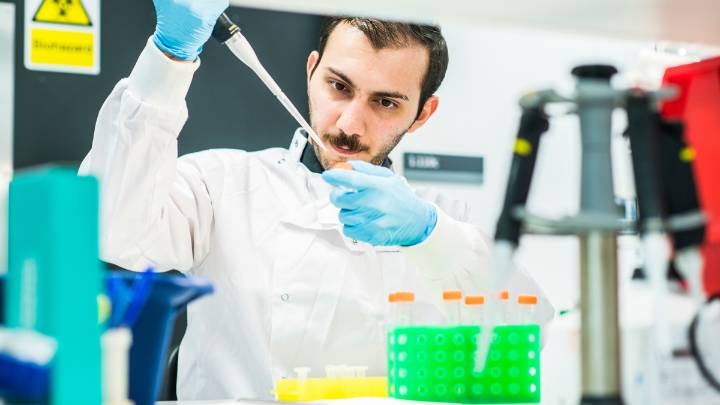
Year 2
- Training activities to support career development
- Mentorship
- Social responsibility
- Second year progress report

Year 3
- Training activities to support career development
- Mentorship
- Thesis planning and submission
- Viva examination
- Support for returning to the MBChB core programme
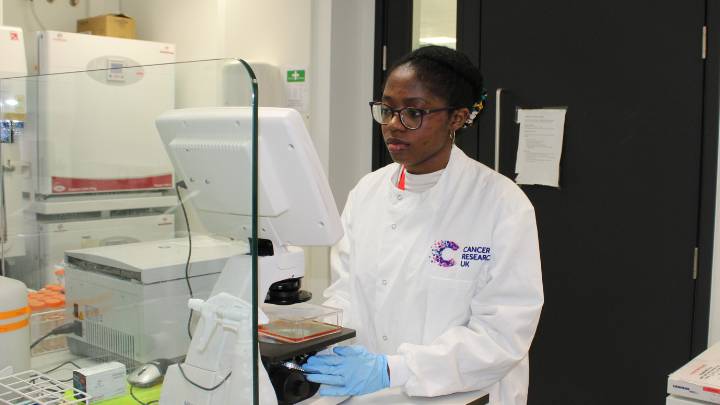
Post-PhD
- Work as an MB-PhD Research Assistant
- Continued mentorship
- Continued research engagement and opportunities via your supervisory group

Hear from our students
What is it like to be a MB-PhD student in Manchester?
Get a glimpse into a day in the life of Jean, a MB-PhD student in cancer sciences.

What I learnt during my placement week
Find out what MBChB student Matthew learnt during his CRUK Manchester Centre MB-PhD summer undergraduate placement.

More from our current students
Learn more about our current CRUK MB-PhD students:
- Hadiyat Ogunlayi (Manchester Cancer Research Centre).
- Nadin Hawwash (CRUK Manchester Centre).

Projects
Helping you choose a project
***Applications for this programme are closed for 2025/26***
A list of projects and their details will be made available on the CRUK Manchester website.
Discuss your project
Prospective candidates are strongly encouraged to contact multiple potential supervisors directly to discuss their advertised projects and research. For general queries and/or supervisor details, please contact us.
Funding
Fully funded studentship
Successful applicants will receive a PhD studentship for the three-year duration of the programme, which includes:
- full funding for PhD tuition fees (up to the UK rate)
- lab costs/running expenses
- an annual tax-free stipend of £21,000 for living costs
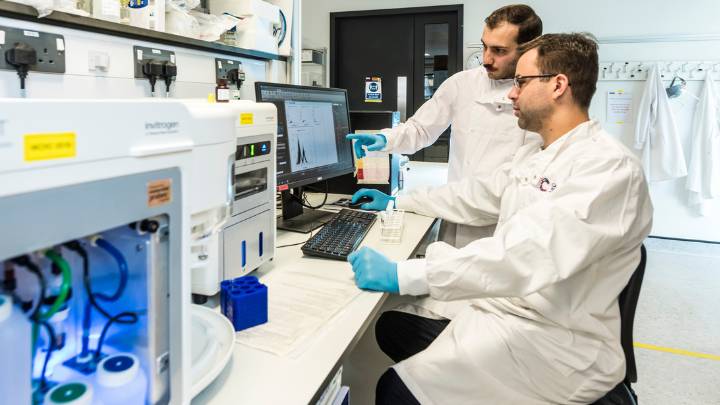
International candidates
International candidates from eligible universities should contact the MCRC Training Office, to discuss fee scholarships available to the highest-performing international applicants at interview.
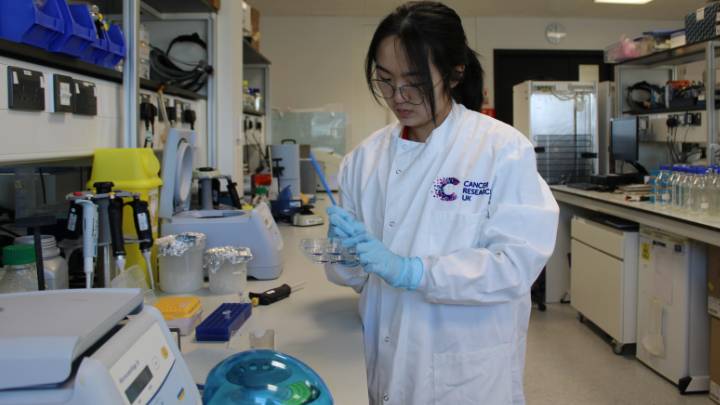
Student loan eligibility
An undergraduate Student Loans Company (SLC) payment up to a maximum of four years of MBChB study (including interest accrual payment), is available subject to completion of key years of study, noting this is capped at £45,000/student inclusive of interest. Students who have paid undergraduate fees via other methods (for example, personal loans), are still eligible for reimbursement but should contact the MCRC Training Office to confirm.
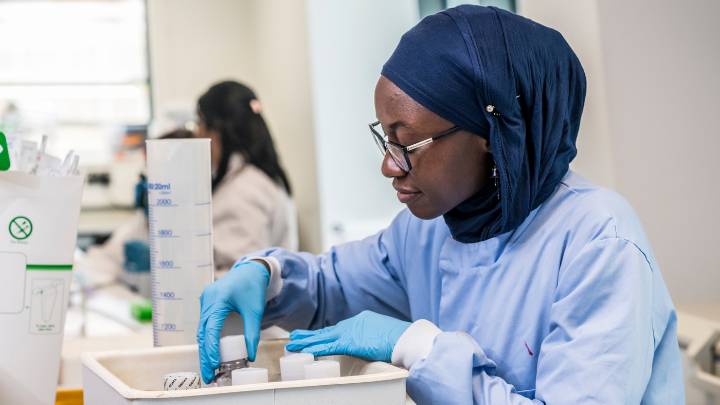
Eligibility criteria
Who can apply?
Candidates should be MBChB students at The University of Manchester, the University of Leeds or the University of St Andrews (Manchester pathway).
The University of Manchester
University of Manchester MBChB students must be either:
- currently studying in Year 3; or
- currently studying in Year 2 and already holding a BA/BSc (Hons) degree classification of an Upper Second or above in a relevant subject;
- or intercalating after either Year 2 or Year 3 of the MBChB.
The University of Leeds
University of Leeds MBChB students must be currently studying in year 3 of the MBChB.
University of St Andrews
University of St Andrews Medicine BSc (Hons) students on the Manchester pathway must be:
- currently studying on Year 3 of the Manchester MBChB, having already obtained a BSc classification of an Upper Second (2:1) or above from the University of St Andrews;
- predicted to obtain a BSc classification of an Upper Second (2:1) or above from the University of St Andrews.
Making an application
Apply for the programme
***Applications for this programme are closed for 2025/26, but late applications may be considered in exceptional circumstances.***
Each year, we recruit a number of undergraduate students onto our three-year PhD programme, with the approval of relevant intercalation teams.
We are looking for candidates who are seeking to develop as clinician scientists of the future.
We encourage candidates to contact multiple potential supervisors as early as possible and to submit their applications before the deadline. However, in exceptional cases, we may consider late applications if places are still available.
If you wish to be considered for the Cancer Research UK MB-PhD programme and meet our eligibility criteria, you must complete an online application.
Follow the steps below, and ensure you submit all the required documents. References can be emailed separately if they are not available to submit immediately (see below).
Key dates
- Intercalation deadline: 24 January 2025
- Application deadline: 7 March 2025
- Interviews: w/c 28 April 2025
- Start date: September 2025
Check your eligibility above before applying and contact the MCRC Training Office with any questions:
Apply online via our online postgraduate application form and ensure you have read all the instructions carefully and register for an account before applying.
To create your online application, follow the application guidance on our CRUK Manchester Centre website.
Once you have submitted your application form, you will receive an acknowledgement that your application has been received.
Your application will be reviewed following the receipt of all your supporting documents and circulated to MB-PhD academic staff and supervisor(s).
You will be kept informed of the progress of your application throughout the application procedure. We will contact you directly if we wish to invite you to interview.
Undergraduate placements
Considering the CRUK Manchester Centre MB-PhD? Try an undergraduate research project.
We offer research placements within the MB-PhD to University of Manchester, University of Leeds and University of St Andrews-Manchester Pathway Medical School students eligible to apply to the MB-PhD programme in future.
The placements will give you a taste of academic research and our MB-PhD programme. Placements last for up to one week.
If you are eligible to apply, you must submit an expression of interest in Spring (dates TBC). Please contact mcrctraining@manchester.ac.uk to be kept up-to-date about 2025 placements.
The placements will be with various supervisory teams and lab groups where you will get a valuable insight into the real world of academic research.
All these supervisors are offering projects to MB-PhD applicants this year, so if you are considering applying for the programme now or in the future, this is a brilliant opportunity to meet the team and to find out if this is the path for you.
See details of the placements available and the supervisory styles on the CRUK Manchester Centre MB-PhD Studentships webpage. Please note, available placements could change ahead of the deadline.
Placement weeks will be arranged between students and supervisors over the summer before the start of the next academic year (2-6 September).
University of St Andrews students can apply for funding from their university to cover expenses. These placements are unpaid but students at The University of Manchester interested in undertaking a summer placement and unable to do so due to financial reasons should get in touch with Georgina Binnie-Wright, Postgraduate Programme Manager, at MCRCTraining@manchester.ac.uk, to discuss.
Students who are interested in this opportunity should send the following details to Georgina Binnie-Wright, Postgraduate Programme Manager, at MCRCTraining@manchester.ac.uk:
- Your name
- Current year of MBChB study
- Are you intending to apply to the MB-PhD programme in future? (Yes/No)
- Are you applying for this opportunity due to a general interest in academic research? (Yes/No)
- 200 words maximum on why you are interested in a placement
- Lab preference(s)
Depending on how much interest is shown, preference may be given to students who are eligible to apply to the MB-PhD programme in the 2024-25 recruitment round (see eligibility on the Cancer Research UK Manchester Centre website).
Expressions of interest should be returned by Monday, 25 March 2024.
Contact us
Have any questions? Get in touch.
Queries regarding the application process and funding can be sent to the MCRC Training Office.
Email: mcrctraining@manchester.ac.uk
University of Manchester intercalation queries should be sent to Professor Sue Atley and the intercalation team.
Email: sue.astley@manchester.ac.uk / intercalation@manchester.ac.uk
